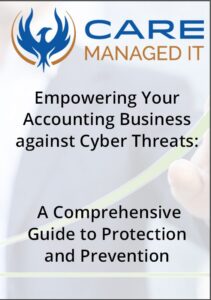As technology continues to advance at an unprecedented rate, the t hreat of cyber attacks is becoming increasingly common in today’s digital age.
hreat of cyber attacks is becoming increasingly common in today’s digital age.
The accounting and bookkeeping industries are particularly vulnerable to cyber threats due to the sensitive financial information they handle on a daily basis.
To address this critical issue, a mini guide has been created, aimed at accountants and bookkeepers, providing best practices and strategies for mitigating cyber risks, enhancing cybersecurity plans, and minimizing the impact of cyber incidents on business continuity.
The guide begins with an overview of cyber threats, including malware, phishing, social engineering, insider threats, and third-party risks.
It provides actionable strategies for minimizing these risks and enhancing cybersecurity plans, such as implementing strong access controls, regularly auditing systems, and training employees on best practices for cybersecurity.
One key focus of the guide is on protecting against third-party risks, particularly those associated with cloud-based systems.
Cloud-based systems are becoming increasingly popular among accounting firms and bookkeepers, but they introduce significant third-party risks that can compromise the security and privacy of sensitive financial and personal information.
The guide provides strategies for selecting and managing cloud providers and best practices for minimizing third-party risks.
Another important aspect of cybersecurity for accountants and bookkeepers is preventing and responding to phishing and social engineering attacks. The guide discusses techniques for recognizing and avoiding phishing emails and messages, as well as reporting suspected phishing attacks.
To help minimize the risks associated with insider threats, the guide provides strategies for minimizing the risks posed by employees, contractors, and other insiders. It also provides best practices for responding to insider incidents.
Finally, the guide provides recommendations for ongoing cybersecurity awareness and training to ensure that employees are aware of the risks of cyber incidents and how to prevent them. This includes regular cybersecurity audits, employee training, and the development of a response plan for cyber incidents.
In the event of a cyber incident, a comprehensive incident response plan is critical for minimizing the impact on business continuity. The guide discusses the importance of an effective incident response plan, key elements of an incident response plan, and strategies for minimizing the impact of cyber incidents on business continuity.
Overall, the mini guide is designed to equip accountants and bookkeepers with the tools and knowledge necessary to protect their business operations and their client’s sensitive financial information from cyber threats. By implementing the best practices and strategies outlined in the guide, accounting firms and bookkeepers can significantly reduce the risk of cyber incidents, maintain the trust of their clients, and ensure the continuity of operations.
Cybersecurity is a critical issue in today’s digital age, and accounting and bookkeeping professionals must take proactive steps to protect their client’s financial data from potential cyber-attacks. The mini guide provides valuable insights and practical strategies for minimizing cyber risks and enhancing cybersecurity plans, including strategies for mitigating third-party risks in cloud-based systems, recognizing and avoiding phishing attacks, and developing effective incident response plans. By following the best practices outlined in the guide and remaining vigilant, accounting and bookkeeping professionals can protect their client’s sensitive financial information and ensure the long-term success of their businesses.
